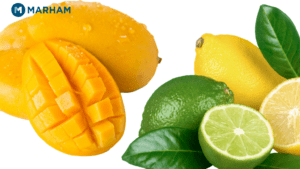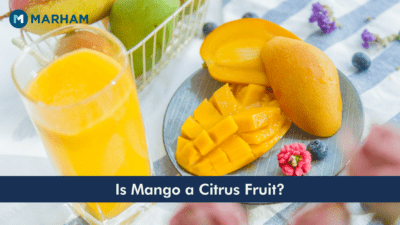Is Mango a Citrus Fruit? A question asked by many people based on the appearance and taste of the mango.
Many people assume that mangoes are citrus fruits due to the fact that it is a juicy fruit with a yellow appearance and sweet tangy flavor.
However, we have enclosed the answer to your question!
Keep reading to find out!
Mango – The King of Fruits!
Mango is a tropical fruit and belongs to the genus Mangifera.
It is popular all around the world but native to the Southern part of Asia specifically Burma, Eastern India, and Andaman Islands.
Mango comes in a range of sizes, shapes, tastes, and textures. Moreover, it has a fragrant, pulpy, sweet, and tart flavor which makes it popular around the world.
Difference Between Citrus Fruit and Stone Fruit?
There is a huge difference between citrus and stone fruits.
Citrus fruits have citric acid in huge quantities and are available around the year. Moreover, they are a renowned and main source of Vitamin C. Citrus fruits include grapefruit, lemon, or orange.
Meanwhile, stone fruits are also known as drupe as they have a stone in the fleshy area and a seed inside the stone. The stone fruit mainly develops from flowers. Stone fruits include plums, coconut, apricots, mangoes, etc.
Nutrient Content Comparison
Citrus fruits are well-known for their nutritional qualities such as Vitamin C content. They are rich in Vitamin C. Therefore, let’s analyze and compare the nutritional content of mangoes and citrus fruits.
Vitamin C:
- Oranges: 60 mg of vitamin C per 100g
- Mangoes: 28mg vitamin C per 100 g
Fiber:
- Oranges: 3.1g fiber per 100 g
- Mangoes: 8g fiber per 100 g (over 2.5 times more)
Phytonutrients:
- Oranges and grapefruit have antioxidants (polyphenols) such as flavonoids
- Mangoes have quercetin, beta-carotene, and astragalin phenolic compounds
Other Minerals & Vitamins:
- Citrus is rich in potassium, folate, and vitamins A, B1, B5, B6, C, and E
- Mangoes also possess folate and potassium. They also have Vitamins A and B6.
Is Mango a Citrus Fruit?
The short answer is No! Mango is not a citrus fruit. It is a tropical stone fruit.
The citrus fruits and mangoes belong to different families.
Mangoes belong to the family Anacardiaceae (Cashews) whereas, citrus fruits including grapefruits, lemons, or oranges belong to the Rutaceae family.
Mangoes are in the same family as pistachios, cashews, and other subtropical and tropical fruit species.
Therefore, from a botanical point of view, mangoes are not citrus fruits from a taxonomic analysis.
| Mango Classification | Citrus Classification |
| Kingdom: Plantae | Kingdom: Plantae |
| Division: Magnoliophyta | Division: Magnoliophyta |
| Class: Magnoliopsida | Class: Magnoliopsida |
| Order: Sapindales | Order: Sapindales |
| Family: Anacardiaceae | Family: Rutaceae |
Here are some key points that depict that mangoes are not citrus fruits:
- Citrus fruits belong to the Rutaceae family. On the other hand, mangoes belong to the Anacardiaceae family.
- Many expert sources such as Royal Botanical Gardens Kew and USDA have classified mango as a tropical fruit and drupe, not citrus.
- Biochemical and histological analysis has shown that mangoes lack characteristic traits of the citrus family. For instance, mangoes have fewer terpenoids and flavonoids as compared to citrus fruits. Their chemical makeup is different from citrus.
Mangoes are not citrus; however, they have coevolved interdependence and share some traits with citrus fruits. However, for now, taxonomists agree that mango is not scientifically a citrus fruit.
Similarities and Differences B/W Mangoes and Citrus
Here are some key similarities and differences between mangoes and citrus:
1. Taste and Smell:
- Citrus is tart or acidic. It has distinctive aromas like lemon.
- Mango is sweet and tangy. It has an aromatic flavor and lacks acidity.
2. Skin/Peel:
- Citrus peel is thick and aromatic with volatile oils. It has internal segments and pulp.
- Mango peel leathery external. It is single-seeded and has internal pulp.
3. Culinary Uses:
- Citrus is commonly juiced, and zested, and sections in drinks or salads.
- Mangoes are used to make juices, chutneys, smoothies, and salsas.


4. Shape:
- Most citrus fruits are spherical. However, the shapes may vary.
- Mangoes are oval-shape or oblong.
5. Color:
- Some citrus fruits, like oranges, range from green to yellow or red. However, the internal citrus sections’ color differs from the external peel color.
- Mangoes are usually yellow, orange, or green.
The Tangy Flavor
Citrus fruits and mangoes are not from a similar family. However, they both share a joined characteristic which is tanginess.
In the case of citrus, the acidic and tangy flavor is due to citric acid.
In mangoes, the tanginess comes from a combination of compounds including malic acid and citric acid. Mangoes have citric acid but the quantity of citric acid depends on the variety and ripeness of the mango.
Wrapping Up
Finally, the answer to the intriguing question “Is mango a citrus fruit” has finally been answered!
Mangoes and citrus fruit share a tangy flavor; however, they are botanically and scientifically different from each other.
They have some similarities which are already mentioned but they have some key major differences due to which we cannot categorize them together.
Moreover, if you need any further information or want a diet plan, then you can book an in-clinic appointment or video consultation with a professional nutritionist in Pakistan via Marham.pk.
You can also book seamless appointments with any doctor by downloading Marham’s application or calling us at 03111222398.
Frequently Asked Questions (FAQs)
1. What kind of fruit is a mango?
Mango is a drupe and a tropical fruit that is available all around the world. It has an outer skin, a central stone that encloses a single seed, and a fleshy edible portion.
2. Do mangoes contain citric acid?
Yes. Mangoes have citric acid but the quantity of citric acid depends on the variety and ripeness of the mango.
3. Is mango an acidic fruit?
Mangoes are slightly acidic which might be a concern for people who are suffering from GERD (Gastroesophageal Reflux Disease) or acid reflux.

